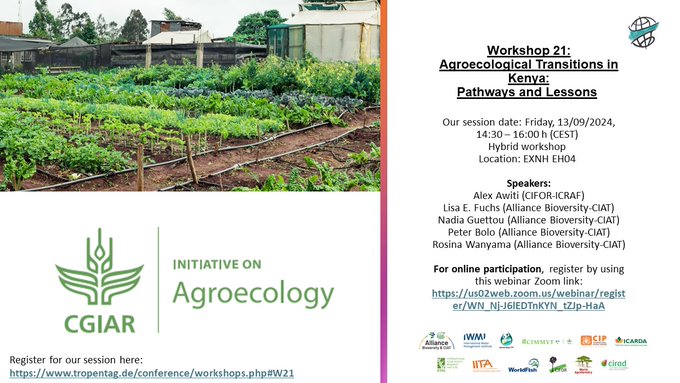In each country, the Initiative concentrates on one or two distinct territories referred to as “agroecological living landscapes” (ALLs), where it engages with researchers, farmers and their associations or communities, private companies, international and national non-governmental organizations as well as local, regional, and national policymakers.
- Burkina Faso: Increasing dairy production sustainably
- India: Leveraging Insights from Agroecology-based Farming Practices
- Kenya: Connecting county-level efforts with national policy
- Lao PDR: Integrating low-chemical input agriculture and aquatic food production
- Peru: Banking on organic cacao, free of deforestation
- Senegal: Toward a more dynamic agroecology movement
- Tunisia: Innovating in socially and culturally significant production systems
- Zimbabwe: Accelerating agroecological businesses
This workshop focused on the work done in Kenya. Main purpose of the session was:
- to have a constructive dialogue among food system experts interested in agroecological transition,
- to share a concrete example of work that has been conducted in Kenya
- to identify clear lessons learnt and pathways that could lead to agroecological transition in LMICs.
- to gather input from the participating food system experts on lessons learnt elsewhere that could drive agroecological transition, relevant for Kenya. These would be key as we move to phase 2 of the Initiative starting 2025.
Question asked by GFAiR:
QUESTION: The political will in Kenya at the moment, is more for inorganic fertilizers.[1] Farmers cultivate Indigenous vegetables using inorganic fertilizer and they have fantastic harvests, the lands are good and so on. How do you reconcile this with your approach?
[1] See also: Falconnier
et all (2023) The input reduction principle of agroecology is wrong when it comes to mineral fertilizer use in sub-Saharan Africa. The authors of this article argue that more mineral fertilizer is needed in SSA for five reasons.
Agroecology is a transdisciplinary, participatory, and action-oriented approach for co-designing options that enhance food system resilience, equity, and sustainability. Working in eight countries of the Global South, the CGIAR Initiative on Agroecology seeks effective ways to put this approach into practice. In each country, the Initiative concentrates on one or two distinct territories referred to as “agroecological living landscapes” (ALLs), where it engages with researchers, farmers and their associations or communities, private companies, international and national non-governmental organizations as well as local, regional, and national policymakers.
[1] See also: Falconnier
et all (2023) The input reduction principle of agroecology is wrong when it comes to mineral fertilizer use in sub-Saharan Africa. The authors of this article argue that more mineral fertilizer is needed in SSA for five reasons.
Related PAEPARD blogposts
- Agroecology TPP - The Dialogues Series: Doing science differently
- The Agroecology Transition: Different pathways to a single destination - Eight country experiences
- 12-13 March 2024. Second Members Forum meeting of the Transformative Partnership Platform on Agroecology
Resource:
CGIAR Initiative on Agroecology. (2023) The Agroecology Transition: Different pathways to a singledestination - Eight country experiences #32 pp.
This report includes the Andhra Pradesh Community-Managed Natural Farming (APCNF)


No comments:
Post a Comment